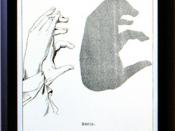In the poem, "Stanley Meets Mutesa" by David Rubadiri, a British man, perhaps Stanley, and his party walk for a long time in both harsh and hopeful conditions. When they reach King Mutesa's kingdom, they are not welcomed warmly because the villagers do not trust the British men. Finally, the British men are allowed into the village without a fight. Secondly, throughout the poem the mood is different. In the first two stanzas the mood is harsh and melancholy because the men are walking under the "fierce and scorching" sun. Also the men were malnourished and physically exhausted because "each afternoon a human skeleton collapsed".
This line puts a very clear image into the reader's mind that the men were dead before they even hit the ground. Next, the mood in the third stanza is hopeful because the men soak their sore feet in the river, and at the end of the stanza there is "no more the burning heat of the day but song, laughter and dance".
In the fourth stanza the mood is cold because the white men are not warmly greeted because they are not trusted. And in the final stanza the mood is melancholy because the villagers welcome the white men. At the end I felt pathos for the innocent villagers because they let in the cunning and greedy white men who want to colonize the village. Similarly, in the novel Things Fall Apart by Chinua Achebe, the villagers allow the white men to stay. But in the novel we learn that the white men provoke the eventual downfall of the villagers' religion and culture, which might not be true in the poem's case.


